#I have a Dream
Text
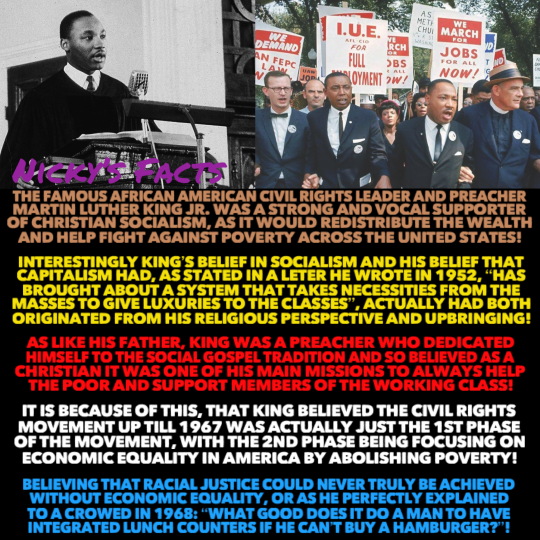
Martin Luther King Jr. was a Christian Socialist!
🕊️
#history#martin luther king jr#civil rights movement#christianity#social change#african american history#mlk day#historical figures#blm#i have a dream#socialism#american history#black tumblr#love not hate#role model#black lives matter#black excellence#black history#martin luther king day#social justice#1960s#united states#civil rights#nickys facts
144 notes
·
View notes
Text
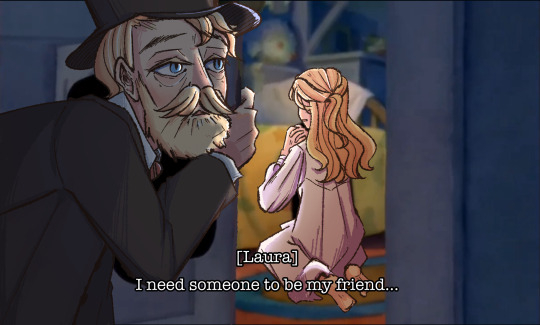
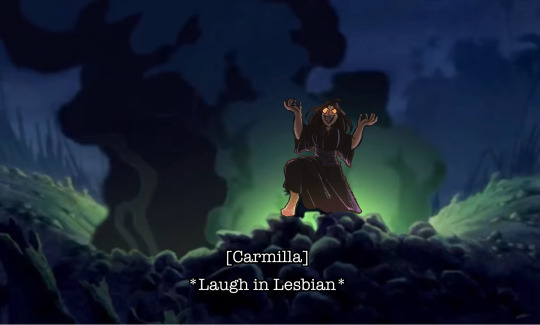
Carmilla (1872) in a nutshell
#carmilla#sheridan le fanu#le fanu#carmilla karnstein#carmilla 1872#artist on tumblr#art#do not repost#carmilla and laura#lilo and stitch#meme#vampire#lesbian vampire#vampires#gothic#gothic literature#gothic lit memes#I have a dream#I’m here to tell#About a wonderful cautionary tale
24 notes
·
View notes
Text
imagine if richas gets a room in fobo. because I mean pepito did. and then what if chyanne and tallulah get one because what's going on with phil and tubbo is their god dad? like. this city of the future cowboys just becomes overrun with babies.
#qsmp#I have a dream#foolish and tubbo together#having such complex family lines#that will somehow connect#if sunny gets her way and tubbo adopts ramon asdfjladskf
24 notes
·
View notes
Text
My dream is to be able to animate like those homies that animated Kill la kill
Y’all see that shit?
It’s so fkn bouncy and goofy
(Think the studio also did lil witch academy)
25 notes
·
View notes
Text




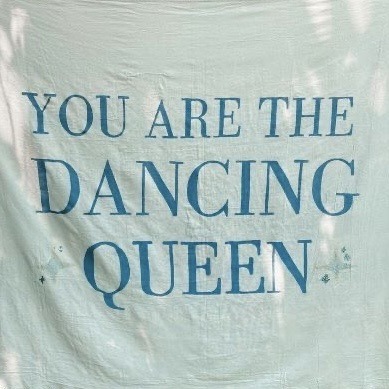



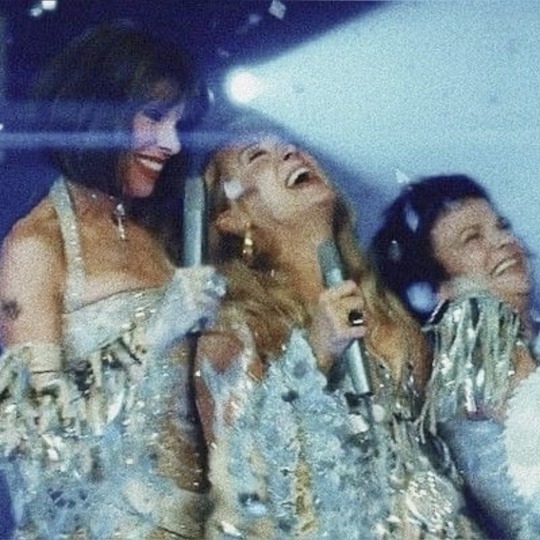
Mamma Mia! mood board
#mamma mia#mamma mia here we go again#abba#dancing queen#i have a dream#thank you for the music#money money money#the winner takes it all#waterloo#greece#voulez vous#donna sheridan#sophie sheridan#sam carmichael#harry bright#bill anderson#rosie mulligan#tanya chesham#sky#favorite movies#love this movie#mamma mia mood board#asethetic#greece asethetic
13 notes
·
View notes
Text
wish i was a rich baron so i could be a patron of the arts™️and invite all ofmd fanartists to come live at my castle or whatever in exchange for pictures of ed and stede kissing filthy and cuddling in bed. is that too much to ask
#personal#ofmd#i have a dream#i'd also buy stede's wardrobe and get it tailored for myself and then i'd just walk around like that#and only drive a pristine jaguar e type roadster with red leather interior#except when i'm driving my horse carriage like a maniac#all rooms include sitting nooks only for sitting (art-ing allowed) and in the summer we wear big hats and have picnics by the lake#i walk from easel to easel with my hands behind my back and nod approvingly#someone falls in the water oh no! their secret love interest jumps in to save them. a mr darcy wet shirt moment ensues#we sit around the fireplace in the evenings and listen to the fanfic authors read their stories#sometimes we even have Visitors. they're intimidated#one room is just kittens#shall i go on#🐭📓
143 notes
·
View notes
Text
In Offense to Emilie Agreste
Hello there everyone, and- ...okay, put down your pitchforks, I haven't even started yet! Before an angry mob gathers 'round my blog, allow me to explain what today's rant is about. Unlike Lila Rossi, whose existence makes me want to hurl bricks at my screen whenever she appears, Emilie Agreste is actually a pretty interesting character. However, there are things about her (both canon and implied) that have me giving this picture-perfect gal a very intense side-eye. So today I'll be talking about what I think of her character, why I think she could have been written better, why she absolutely isn't a good person, and how the narritive does her a diservice by reducing this poor lass to an insignificant plot device, just so her clinically insane husband can have a reason to bully teenagers in spandex!
Firstly, let's quickly establish what we know about Emilie. I'll explain why I believe anything that isn't directly stated later, now it's just the basics. She and her sister Amelie are coming from a well-off family in England, presumably with quite high standards and expectations. We know little about her early life and it frankly isn't important, but she does at some point take an interest in the creative arts. She firsts meets her husband-to-be Gabriel when she arrives in Paris to further her education, and it's easy to assume they become friends due to similar interests. Then, later down the line, they meet Nathalie Sancoeur, with whom they scour the world to find the Miraculous jewels. After they do find the Butterfly and Peacock in Tibet, they all return to Paris and she creates Adrien Agreste, her son, using Duusu's powers. About twelve years later, she falls ill and "into a deep sleep" because the Peacock Miraculous was broken. This kicks off Gabriel's descent into madness and his crusade as Hawkmoth, which slowly drove him to insanity for reasons seen in this post. But still, this vague timeline leaves us with a lot of questions as to who she was as a person, and how she lived her life.
Before I delve deeper into this, I would quickly want to clarify the sources for the above information. We know from Represenation that Emilie met Gabriel when she went to Paris for educational reasons. I honestly don't remember if her field of study is mentioned, but considering she later stars in Andre's film "Solitude" it isn't hard to derive that said studies could be related. The high expectations from Emilie's family come from the fact that Gabriel had to change his name at some point in life, possibly because Emilie's parents wouldn't accept her marrying some "lowborn". Additionally, we know Amelie's marriage to Colt was arranged, so there definately is a sense of "securing the family lineage" here that exists in what remains of aristocracy today. In Passion, Nathalie is implied to be a treasure hunter of some sort at the time she meets Gabriel and Emilie, though how long she's been at the profession isn't clear. Still, they do work together to find the Butterfly and Peacock Miraculous. We see in Evolution that they are occupying the Agreste Manor with the Peacock in hand, so it's possible they purchased the house either right after their trip to Tibet or before. Other relevant information comes from the thumbnails of Emilie's videos and photos from the Passion episode.
As an aside, Astruc better give us that Tibet special, because I need more Agreste family Lore! These people made their drama the entirety of France's problem and while I respect that, I need to know more! Also, Thomas' quote of "a lot can happen when three people are in close proximity for a long time"? Pretty sure that's from Twitter btw, if you want to look it up. I see you, Thomas...I see you...
Anyway, onto exploring Emilie's themes as a character. From the very start of the show, we have a lot of clues that point to her being an angelic, kind and can-do-no-wrong type of character, at the very least in Gabriel's eyes. There is a whole other topic here about him being obsessed with the past and looking at it with rose-tinted glasses, but I digress. The portrait of Emilie in the atelier, her photo in Adrien's room, and Gabriel's fond remniscing all give us the idea that she was a wonderful, lovely person! In fact, we even get a bit of personallity added to her in the Simon Says episode, where Gabriel tells Chat Noir "you have some of her (Emilie's) flair for dramatics". So of course, she was goofy sometimes, which is a trait we see Amelie share at least a little of in the Felix episode, what with her Elsa-style entrance into the manor. For Season 1, we got plenty of information as to her character, even if we didn't know her name quite yet.
In Season 2 we get more of these examples of her being a wonderful person who is dearly missed, such as the whole plot with the above-mentioned Solitude movie, and Adrien wanting to go see it. Why exactly Parisian cinema is playing this movie in the first place considering what we know about Andre abandoning his career as a director is completely unknown and reeks of a plothole to me, but then again so do half the episodes in general. Point is, from very early on in this show we get a positive perspective on Emilie's character. Sure, there's a lot we don't know about her, but I'm sure her wedding day, her early years with Gabriel, their actual relationship, whatever she had going on with Nathalie, and the whole drama with her parents and later Amelie's husband isn't important...right?
Yeah no I'm not letting her off the hook. Aside from the obvious Adrien stuff that I'll get into in a bit, it seems suspicious to me that nobody can ever come up with anything negative to say about Emilie. And I don't mean a genuine character flaw, even if nobody is perfect, I mean just...something embarrassing? An old joke shared between friends from college, a little detail that sheds light at her sense of humor, even a fond recollection of something silly that happened in her youth. There's nothing. Aside from Gabriel saying she had a dramatic flair, which I will talk about, we know nothing about Emilie Agreste as a person. She barely feels alive, almost existing solely to be the "dead wife" archetype of the show. And okay sure, some of that is the fault of whoever was in the writing room when they try to bring her up. But come on, you're telling me Nathalie doesn't have a single memory or photo in that large stack of recollections that shows her being alive for once?
And of course I don't mean Emilie being literally alive, we see plenty of that. But think back to the photo with Gabriel, Audrey, Emilie and Andre for a second. As an example. I can't recal the exact details, but Emilie is standing to the side, closer to being out of frame than anyone else. In the middle of the shot, the other three seem to be having a good time, but she's only giving a polite, proper smile to her friends. Naturally, not every person out there is extremely expressive, but this is a safe space. Emilie is with close friends and everyone is enjoying themselves, yet her face looks like she came out of a portrait. When I noticed that little detail, I went running to find more. Aside from the videos that she left behind, we've never seen her speak or interact with any character excepting that Evolution scene where she first gets the Miraculous. So can we please think about this logically for a second? What kind of person is Emilie Agreste?
She was born in high society, with a lot of expectations on her shoulders and only her sister for company in her formative years, if Adrien and Chloe's sibling-like bond is anything to go by. And yes that's another post entirely, but they were childhood friends and he had almost nobody else his age to talk to, so I'm drawing a parallel. I won't speculate at all about Emilie's childhood, because frankly it's irrelevant to today's conversation. What I will say however, is that everyone we meet who has interacted with her has fond memories and good things to say about her. And every depiction of Emilie we get, even those not made by Gabriel, she seems to radiate perfection. And that right there is her character's theme. Being perfect. She presumably was the perfect daughter, the perfect (or at least a good enough) student to go to France in order to further her education, so on and so forth. But her family life very much isn't anything close to that. For one, her sister is stuck in an arranged marriage with an abusive a-hole who seems to have been spat directly out of a Texas steretype. There is no indication that Emilie knew about this, but...she also eventually let Colt borrow the Peacock Miraculous to make Felix. Clearly she entrusted Colt Fathom of all people with a magical artifact that can make sentient life, because sure, that seems perfectly reasonable!
Of course signs of abuse are hard to notice even when directly pointed out, but for the purposes of Emilie and Amelie, it seems fundementally against the good, pure and angelic character that Emilie has been presented as to even consider handing Duusu over to Colt. I'm ignoring the issue of Tomoe since that hasn't been explained, but there's clearly something wrong here. And now...now we come to Adrien's home life. We know that he has never been to public school before Origins, which happened only because Chloe enrolled him by the way, and Gabriel does allow him to go at the end of the day. We didn't know at the time, but it does seem reasonable for Gabriel to refuse him completely here, seeing that in hindsight, Adrien's class specifically becomes a hotspot for Akumatizations. But despite this danger, Gabriel still allows Adrien to remain in public school. Additionally, it's completely reasonable to assume that a pre-teen and later teenager would want more freedom to explore the world, and I find it incredibly unlikely that Adrien only expressed this after Emilie keeled over. Surely, this child would have wanted to make friends before then, especially if Chloe would brag about how many friends she has in school, which seems like a thing she would absolutely do to impress him. Sure, that last bit is speculation, but Chloe does act like this all the time in Season 1, so it's natural to consider that she did so before too! The thought of Gabriel being the permissive parent here, and therefore not the one keeping Adrien inside all the time...it really frightens me.
And just to be clear, this isn't a tinfoil-hat "Emilie is secretly evil" theory or anything like that. I'm just saying that she isn't perfect, never has been, and actually made a lot of mistakes during her life. Especially with Adrien. Because doesn't it seem like a loving mother's attitude to want to spend time with her precious son, showing affection and being with him at all times? As a reminder, unless the concept of adoption was never invented in this universe, Emilie Agreste could have just grabbed a child out of an orphanage at any point during her lifetime. But instead, she specifically wanted this one, Adrien. And what does she do to get her precious, perfect baby boy? Why, she scours the entire planet with her huband (possibly to-be) and her definately-not-side-chick Nathalie the treasure hunter to find a magic brooch that gives her the power to make him herself, exactly how she wants! Plot aside for a minute, doesn't that sound a little bit insane to you? The desire to have a child alone wouldn't drive anyone to go to such lengths, and this is assuming she is infertile or has some other problem that a good night under the stars with her pals Gabriel and Nathalie won't fix!
Clearly, Emilie had something very specific in mind when going through all the magical, mystical and half-maddening hoops that she had to go through in order to make Adrien in the first place! She practically dragged her husband and their friend on a worldwide trip just to find some tiny bird goddess stuck in a brooch! Are you reading this correctly? And then after Adrien popped into existence (presumably by being carried to term, etc.) Emilie made sure to shower him with love and adoration. But she also kept him isolated, and secure. This isn't as much speculation as it is just reading between the lines, but Adrien seems constantly awestruck throughout the show when presented with new experiences. Not to mention another disturbing thing, she was put inside the life support pod with Adrien Amok on her finger! That's a huge red flag, right in front of us, but it's been ignored because Gabriel is the one who uses it on-screen. Consider that by the time he does use the Ring, Gabriel is well on his way to utter insanity, considering that Shadowmoth is already unhinged enough to quickly evolve into Monarch once the conditions are right. Gabriel has absolutely no chill when it comes to terrorizing innocent people, or using Adrien's Amok to control him when need be. So why is there an implication of Emilie doing the same when she should have been perfectly sane and not driven to desperation because of a loved one's loss like her husband? Again, go check out this post for a full Gabriel analysis.
I'm not saying that Emilie was evil or crazy or a psychopath or anything of the sort. I'm telling you all that she had control issues. Among all the other stuff we know, and with said information pool being tiny to start with, Emilie Agreste seems so intersting! There should have been a whole plot point about removing the rose-tinted glasses that her death cast down on Gabriel, Adrien and Nathalie! There should have been flashbacks to when she was alive! We should have seen her interact and show love towards Adrien! To her credit, Emilie did see that her death was going to mess with Gabriel's head tremendously, and left him a little video politely asking that he doesn't become an internation terrorist. You know, just as a failsafe. It sure is a shame that she never had that conversation with her husband when she was still awake, or that to our knowledge, never said goodbye to Adrien. The public narrative is that she "disapeared". Are you joking me? Of course Gabriel covered everything up, but this is never adressed!
The writers have a ironically perfect character in their hands! Emilie is a mystery to the audience, she has a complicated relationship with both the show's main villains (Lila doesn't count if she's in barely a dozen episodes), one of the titular characters, and is also literally the reason why the show's events kick off in the first place! But we are shown nothing of her for over one hundred episodes of Miraculous! Even Ephemeral, one of the episodes I hate the most in the whole show, could have given us a glimpse into whatever Gabriel's restructured world would have looked like! It was the perfect oppurtunity for us to see Emilie up on her feet and actually having a role to play, instead of just discount Mrs Freeze! Yes I know her name is Nora, I know it's not the same situation, shush, I'm making a "Emilie is in the basement fridge" joke. The writers and Thomas did this woman so dirty it's not even funny! And I am offended at her, because at the end Emilie serves no purpose than to have Gabriel be "sympathetic" in Season 2! There are a dozen plot threads just dangling around for them to rip out of the ceiling and play with, but Emilie's very existence amounts to absolutely nothing! A gravestone would have served as a better character, because at least there could be something useful writen on it! Some kind of descriptor that gave us any insight into her personality!
But no, she's a blank slate! She's just some gal that showed up, found a magic peafowl and keeled over, ultimately leading to Adrien's sheltered home life, social awkwardness, and mommy issues! Because you cannot tell me that Emilie's parenting, no matter how well-meaning, didn't screw Adrien's early life up! She could have been the best mum in the world and it still wouldn't have mattered, because she considered him her perfect creation! Can you see the irony here? Can you observe the myriad of metaphors and the hundreds of ways this can get included in a story? Does Thomas Astruc and his team want me to have a mental breakdown??? Like, excuse me, honestly excuse me, but the sheer amount of offense I take both on Emilie's behalf and to her utter uselessness in this franchise is astronomical! I love this character! I really do! Wrote a whole alternate backstory for her where she and Nathalie are college roomates and everything! Heck, I love her so much that I did make her into a crazy psychopath in one of my AUs just so she can play a key part in that story as the Hawkmoth-equivilant! My love and adoration for Emilie Agreste reaches the god damned moon and back, but unless she actually has more than ten seconds of dialogue in some kind of flashback or prequel, I will continue to be offended! I'll continue to be pissed! And I'll continue to pray for the day where she becomes more than a practically irrelevant plot device!
Anyway, I need to cool off. I need to have a drink. I need to relax and take a break before making the post in defense of poor Chloe, because she too got shafted by the narritive, just like Adrien's mum. Expect it sometime soon, or at the very least when I'm not going insane over the fact that despite directly causing every major event in this franchise to occur, Emilie Agreste is a bigger question mark than the dude in a banana costume. Seriously, what the heck is up with Mr Banana anyway? I'll be seeing you all soon, but until then, Stay Miraculous everyone!
#miraculous ladybug#emilie agreste#rant post#character analysis#yolo rants#i have a dream#i'm here to tell...#about an emilie agreste that isn't a cardboard cutout!#no i'm not biased#i just want people to understand#that yes#emilie's choices kickstarted the whole show#and that's cool#but she's one of the most important characters#and does nothing!#she's reduced to a wax statue inside gabriel's basement fridge!#and there is actually a fic about that#somewhere on ao3...#but anyhow#point is i'm offended#both because of her#and on emilie's behalf#like please give this woman some dialogue#thomas would it kill you to use your characters properly???#cuz you not doing that is killing me!#anyway i need to take a break#feel free to give your thoughts in replies/reblogs#i'll go insane#so yeah#i'll see myself out
12 notes
·
View notes
Text
44 notes
·
View notes
Text

Behbeh
#Behbeh#mlk#mlk day#black history#civil reights#i have a dream#washington dc#american history#cartoon#memorial#mlk memoria#dailybehbeh#behbeh#cute#stuffed animal#art#history#polar bear
19 notes
·
View notes
Note
https://twitter.com/stopkookminpls/status/1712772202716610862?t=LkBM9euhw7UTJnYIRyIUEQ&s=19
Waiting for your view 🥹
There is nothing to say my lovely.
I just hope JK is taking care of himself and letting Jimin take care of him. And I hope he wraps up his work soon. And they can both walk together into the MS sunset.
Then they will serve... its all gonna go smoothly (In Jesus' name) Then they'll come back in 2025, group activities will pick up where they left off and Jikook antis gon get got.

33 notes
·
View notes
Text
MLK-I HaveADream
18 notes
·
View notes
Text
each week this month we’ve done a lesson on someone important in the civil rights era for black history month. today it was MLK JR and we learned about his dream for America and the world.
as a class we discussed our dreams for the world, with my example of: I have a dream that every child gets to grow up safe and healthy. And then I asked my class to tell me their dreams so they could draw them for me.
Mind you I teach four and five year olds. So we had some range, but this the best example of what that range was:
“I have a dream that everyone can have a miracle!” followed directly by “I have a dream that everyone can pet a pig!”
#i have a dream#martin luther king jr#the life and times of a pre-k teacher#daycare teacher#pre kindergarten
13 notes
·
View notes
Text
Look for the enemies of Medicare, of higher minimum wages, of Social Security, of Federal aid to education, and there you will find the enemy of the Negro, the coalition of Dixiecrats and reactionary Republicans that seek to dominate the Congress.
—A. Philip Randolph, speaking at The March on Washington 60 years ago
#prescient#a philip randolph#civil rights#dixiecrats#republicans#march on washington#i have a dream#living wages#social security#education#a. philip randolph
37 notes
·
View notes
Text
I just want Penn Badgley and Ed Speleers to have one (many) interview together and talk about the chemistry they had on screen, do it for the goldrose nation.
#you season 4#joe goldberg#jonathan moore#rhys montrose#GOLDROSE#penn badgley#ed speleers#i have a dream#PLEASE INTERVIEW
68 notes
·
View notes
Text
I have a dream:
I say to you today, my followers & friends…
Even though we may face difficulties knowing wtf certain wojaks are all about today and tomorrow, I still have a dream. It is a dream deeply rooted in cataloging the Wojaks.
I have a dream that one day the world will rise up and know the true meaning of lost and obscure wojaks that lurk around in the shadows of the internet.
We will hold these lost truths to be known and perhaps one day they will be self-evident. That all lost wojaks are found, and continue to be created & modified in open source and shared equally free on the internet.
I have a dream.
13 notes
·
View notes
Text

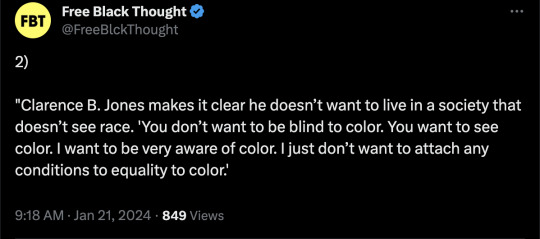
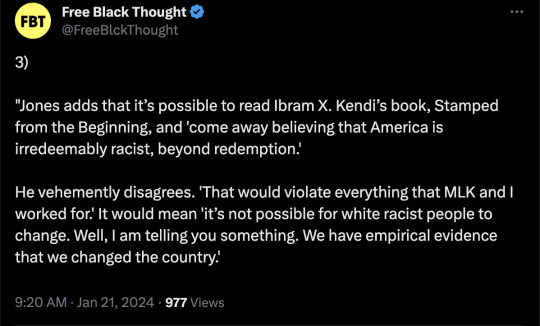
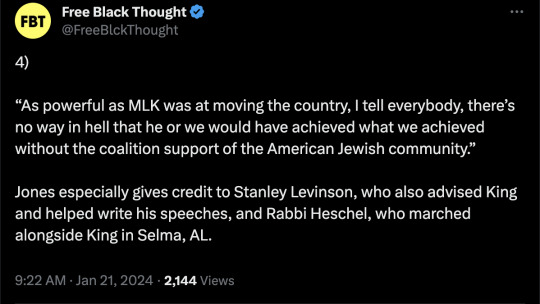


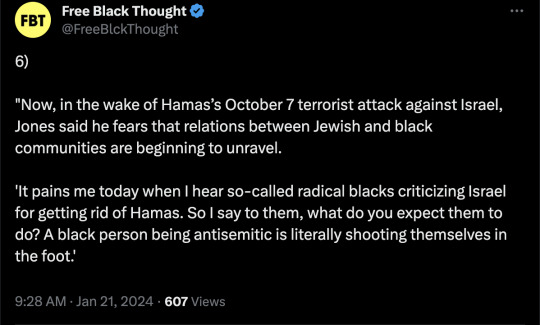
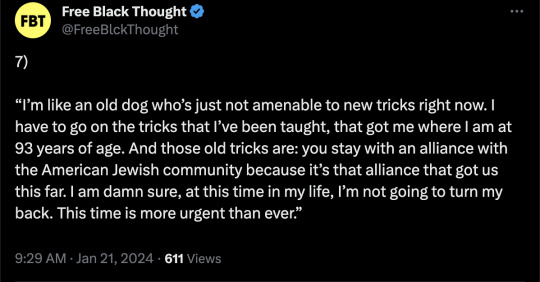
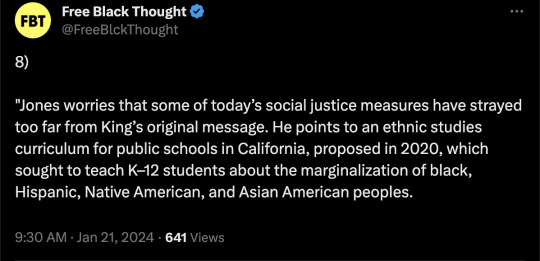

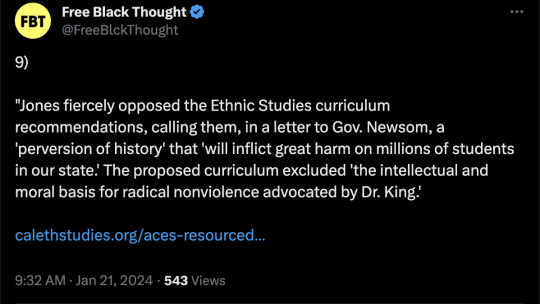
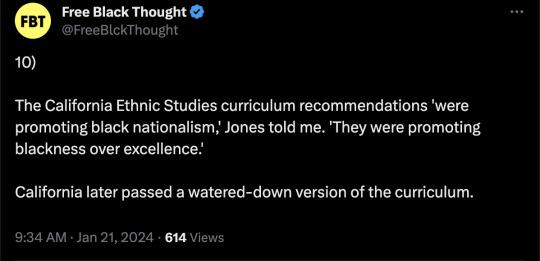

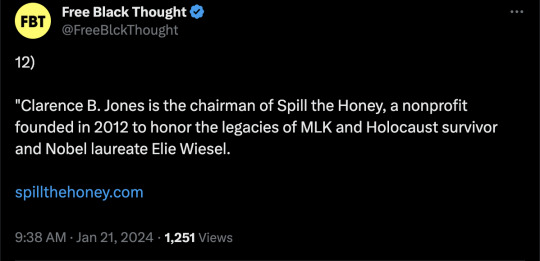
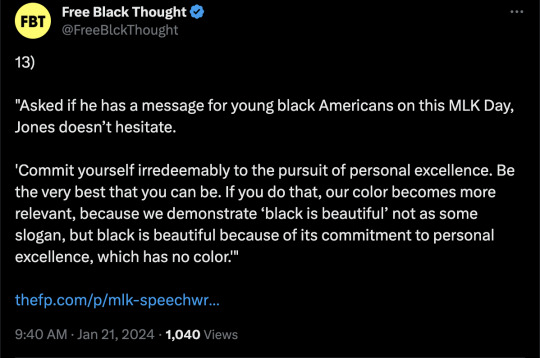
By: Francesca Block
Published: Jan 15, 2024
In the 1960s, when Clarence Jones was writing speeches for Martin Luther King Jr., he used to joke with the civil rights leader: “You don’t deserve me, man.”
“Why?” King would ask.
“I hear your voice in my head. I hear your voice in perfect pitch,” Jones would respond. “So when I write, I can write words that accurately reflect the way you actually speak.”
King would agree. “Man, you are scary. It’s like you’re right in my head.”
And Jones is still, in his mind, having conversations with his friend, who was assassinated at the age of 39 on a Memphis hotel balcony in 1968. Especially now, as America’s racial climate seems to have worsened, despite the fact that King successfully fought to ensure all Americans are given equal protection under the law, regardless of their skin color. A poll from 2021 shows that 57 percent of U.S. adults view the relations between black and white Americans to be “somewhat” or “very” bad—compared to just 35 percent who felt that way a decade ago.
Jones knows exactly what King would have felt about that. He says it out loud, and directs it to his late mentor: “Martin, I’m pissed off at you. I’m angry at you. We should have been more protective of you. We need you. You wouldn’t permit what’s going on if you were here.
“We are trying to save the soul of America.”
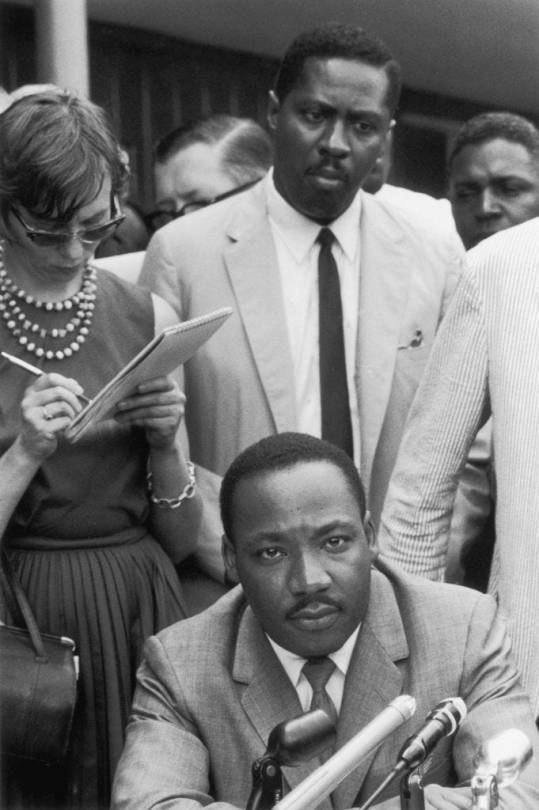
[ Jones, behind Martin Luther King Jr. in 1963, wrote: “I saw history unfold in a way no one else could have. Behind the scenes.” ]
I spoke to Jones, 93, two weeks ago as he sat on a beige couch in the humble second-floor apartment in Palo Alto, California, that he shares with his wife. A black-and-white close-up of King sits directly above his head, almost like a north star.
“Regrettably, some very important parts of his message are not being remembered,” Jones said, referring to King’s belief in “radical nonviolence” and his eagerness to build allies across ethnic lines.
“Put in a more negative way,” he added, King’s messages “have been forgotten.”
Jones was a young, up-and-coming entertainment lawyer when he first met King in February 1960. The preacher had turned up on the doorstep of his California home and tried to convince him to move to Alabama to defend him from a tax evasion case. But Jones wasn’t interested.
“Just because some preacher got his hand caught in the cookie jar stealing, that ain’t my problem,” he said in a talk, years later.
But King wasn’t one to give up easily. He invited Jones to attend his sermon at a nearby Baptist church in a well-to-do black neighborhood of Los Angeles. Standing at the pulpit, King spoke to a congregation of over a thousand people, delivering a message that seemed almost tailor-made for Jones.
Jones remembers King talking about how black professionals needed to help their less fortunate “brothers and sisters” in the struggle for equality. He realized, then and there, what an incredible speaker King was, and felt compelled to join his cause.
“Martin Luther King Jr. was the baddest dude I knew in my lifetime,” Jones says.
Jones moved down to Alabama to join King’s legal team. He helped free King of any charges in Alabama, and quickly became one of the leader’s closest confidants, and ultimately, his key speechwriter.
Jones refers to himself and King as “the odd couple,” because, he says, “we were so different.” King was the son of a preacher from a middle-class family in the South. Jones grew up the son of servants, raised by Catholic nuns in foster care in Philadelphia, who he credits with instilling in him “a foundation of self-confidence that was like a piece of steel in my spine.”
He said this confidence propelled him to graduate as the valedictorian from his mixed-race high school just across the border in New Jersey, and then on to Columbia University, where he earned his bachelor’s degree in 1953. After a brief stint in the army, where he was discharged for refusing to sign a pledge stating that he was not a member of the Communist Party, Jones enrolled at the Boston University School of Law, graduating in 1959.
Though Jones was mainly a background figure in the 1960s civil rights movement, it might not have been possible without him. He fundraised for King’s Southern Christian Leadership Conference so successfully that Vanity Fair later called him “the moneyman of the movement.” In 1963, when King was in prison, Jones helped smuggle out his notes, stuffing the words King scrawled on old newspapers and toilet paper into his pants and walking out.
Later, he helped string those notes together into King’s famous address, “Letter from Birmingham Jail,” which argued the case for civil disobedience, and was eventually published in every major newspaper in the country.
Jones then wooed enough deep-pocketed donors, including New York’s then-governor Nelson Rockefeller, to raise the bail needed to release King and many other young protesters from jail.
Jones also helped write many of King’s most iconic speeches—“not because Dr. King wasn’t capable of doing it,” Jones emphasized—“but he didn’t have the time.” Jones crafted the opening lines of King’s “I Have a Dream” speech from his D.C. hotel room on the eve of the 1963 March on Washington. In his book, Behind the Dream, he recounts how he penned their shared vision for a better nation onto sheets of yellow, lined, legal notepaper, many of which ended up crumpled on the floor.
But he didn’t write the most famous words: “I Have a Dream”—that was all King, his book notes. “I would deliver four strong walls and he would use his God-given abilities to furnish the place so it felt like home,” Jones writes about their speech-writing dynamic.
The day after he wrote that speech, Jones stood just fifty feet behind King as he delivered it to the hundreds of thousands gathered on the steps of the Lincoln Memorial. “I saw history unfold in a way no one else could have,” Jones writes. “Behind the scenes.”
The movement King led with Jones by his side helped achieve school integration, the Civil Rights Act of 1964, and the Voting Rights Act of 1965.
So, when asked if America has made any progress on race, Jones is dumbstruck. “Are you kidding?” he said, with shock in his voice. “Any person who says that to the contrary, any black person who alleges themselves to be a scholar, or any white person who says otherwise, they’re just not telling you the truth.
“Bring back some black person who was alive in 1863, and bring them back today,” he adds. “Have them be a witness.”
But after the death of George Floyd in 2020, 44 percent of black Americans polled said “equality for black people in the U.S. is a little or not at all likely.” And “color blindness”—the once aspirational idea of judging people by their character rather than their skin color, which King famously espoused—has fallen out of fashion. The dominant voices of today’s black rights movement argue that people should be treated differently because of their skin color, to make up for the harms of the past. One of America’s most prominent black thinkers, Ibram X. Kendi, argues that past discrimination can only be remedied by present discrimination.
Jones makes it clear he doesn’t want to live in a society that doesn’t see race. “You don’t want to be blind to color. You want to see color. I want to be very aware of color.”
But, he emphasizes: “I just don’t want to attach any conditions to equality to color.”
He adds that it’s possible to read Kendi’s prize-winning book, Stamped from the Beginning, and “come away believing that America is irredeemably racist, beyond redemption.”
It’s a theory he vehemently disagrees with. “That would violate everything that Martin King and I worked for,” he said. It would mean “it’s not possible for white racist people to change.”
“Well, I am telling you something,” Jones adds. “We have empirical evidence that we changed the country.”
Jones is the first to admit King and his circle didn’t change the country on their own.
“As powerful as he was at moving the country, I tell everybody, there’s no way in hell that he or we would have achieved what we achieved without the coalition support of the American Jewish community.”
Jones especially gives credit to Stanley Levinson, who also advised King and helped write his speeches, and Rabbi Abraham Joshua Heschel, who marched alongside King in Selma, Alabama. He remembers being on the picket lines and talking to Jewish protesters who told him about their own families’ experiences in the Holocaust.
“There would have been no Civil Rights Act of 1964, no Voting Rights Act of 1965, had it not been for the coalition of blacks and Jews that made it happen,” Jones says.
Now, in the wake of Hamas’s October 7 terrorist attack against Israel, Jones said he fears that relations between the Jewish and the black communities in America are beginning to unravel.
He said he has seen how, days after the attack, college students—many of them black—marched on campus, chanting for the death of Israel.
“It pains me today when I hear so-called radical blacks criticizing Israel for getting rid of Hamas. So I say to them, what do you expect them to do?”
He continues: “A black person being antisemitic is literally shooting themselves in the foot.”
Long before October 7, Jones has proudly shown his allegiance to the Jewish people: a gold mezuzah—the small decorative case, which Jews fix to their door frames to bless their homes—is nailed outside his Palo Alto apartment.
“I’m like an old dog who’s just not amenable to new tricks right now,” Jones says. “I have to go on the tricks that I’ve been taught, that got me where I am at 93 years of age. And those old tricks are: you stay with an alliance with the American Jewish community because it’s that alliance that got us this far.
“I am damn sure, at this time in my life, I’m not going to turn my back. This time is more urgent than ever.”
Meanwhile, Jones worries that some of today’s social justice measures have strayed too far from King’s original message. He points to an ethnic studies curriculum for public schools in California, proposed in 2020, which sought to teach K–12 students about the marginalization of black, Hispanic, Native American, and Asian American peoples.
Jones fiercely opposed the new curriculum recommendations, calling them, in a letter to Governor Gavin Newsom, a “perversion of history” that “will inflict great harm on millions of students in our state.” He wrote that the proposed curriculum excluded “the intellectual and moral basis for radical nonviolence advocated by Dr. King” and his colleagues.
“They were promoting black nationalism,” he told me. “They were promoting blackness over excellence.”
California later passed a watered-down version of the curriculum.
At the same time, Jones feels more conflicted about affirmative action, a policy he believes was grounded in “the most genuine, the most beautiful, the most thoughtful” intentions, and that it helped to “accelerate the timetable. . . to truly give black people equal access.”
Even so, he is pragmatic about the Supreme Court’s decision to strike it down last year. “You had to stop the escalator somewhere.”

[ Jones is still working. He released his autobiography, The Last of the Lions, in August, and is now recording the audiobook. ]
In the immediate years after King’s death in 1968, Jones struggled to find a path forward. He was angry and even considered “taking up arms against the government,” which he blamed for allowing King’s death to happen.
For a while, Jones dabbled in politics—serving as a New York State delegate at the 1968 Democratic Convention—and then in media, purchasing a part of the influential black paper New York Amsterdam News. In 1971, he acted as a negotiator on behalf of some of the inmates behind the Attica prison uprising, unsuccessfully trying to seek a peaceful resolution.
But King’s voice—always in his head—eventually steered him back toward his original purpose.
A father of five, Jones lives with his wife, Lin, just a five-minute walk from the Stanford campus where he maintains an affiliation with the Martin Luther King, Jr. Research and Education Institute. In 2018, Jones co-founded the University of San Francisco’s Institute for Nonviolence and Social Justice to teach the lessons of King and Mahatma Gandhi “in response to the moral emergencies of the twenty-first century.”
He is also the chairman of Spill the Honey, a nonprofit founded in 2012 to honor the legacies of King and Holocaust survivor and Nobel laureate Elie Wiesel. And in August 2023, he released his autobiography, The Last of the Lions, so named because he is possibly the only member of King’s civil rights circle still alive. “There’s an African saying that I often reflect upon when I think about his legacy and my own part in his movement,” Jones writes in his book. “If the surviving lions don’t tell their stories, the hunters will take all the credit.”
Although the eight years he spent with King happened more than half a century ago, Jones told me he now sees his mission as clearly as ever. Asked if he has a message for young black Americans on this Martin Luther King Jr. Day, he doesn’t hesitate.
“Commit yourself irredeemably to the pursuit of personal excellence,” he says emphatically. “Be the very best that you can be. If you do that. . . our color becomes more relevant, because we demonstrate ‘black is beautiful’ not as some slogan, but black is beautiful because of its commitment to personal excellence, which has no color.”
==
What's going on now is what happens when activists and fanatics, such as frauds like Kendi and Nikole Hannah-Jones, construct history curriculum, not actual historians. If they teach the Jewish allyship with the Civil Rights Movements at all, it will be wrapped in conspiracy theory such as "interest convergence."
https://newdiscourses.com/tftw-conspiracy-theory/
This doctrine insists that white people (as the racially privileged group) only take action to expand opportunities for people of color, especially blacks (see also, BIPOC), when it is in their own self-interest to do so, and in which case the result is usually the further entrenchment of racism that is harder to detect and fight. Under interest convergence, every action taken that might ameliorate or lessen racism (see also, antiracism) not only maintains racism, but does so because it was organized in the interests of white people who sought to maintain their power, privilege, and advantage through the intervention.
One of the truly gross and despicable things about frauds like Kendi is that while he pulls every bogus fallacy to assert that nothing has changed - it's a tenet of Critical Race Theory that nothing has changed, racism has only gotten better at hiding itself and becoming more entrenched - his own success blows this conspiracy theory completely out of the water, given how fawning his acolytes are about his wildly overstated wisdom, and the number of white fans he's accumulated who masochistically want to be told how racist they are and how much they hurt black folk every single day.
That's not possible unless racism is both aberrant and socially and culturally unacceptable.
#Clarence B. Jones#Clarence Jones#MLK Day#MLK Jr Day#Martin Luther King Jr#Martin Luther King#Martin Luther King Day#i have a dream#Henry Rogers#Ibram X. Kendi#black nationalism#colorblindness#color blindness#colorblind#color blind#antiracism#antiracism as religion#antisemitism#am yisrael chai#pro palestine#pro hamas#islamic terrorism#israel#palestine#hamas terrorism#hamas war crimes#exterminate hamas#religion is a mental illness
10 notes
·
View notes